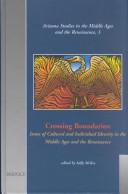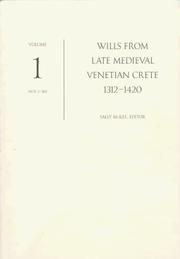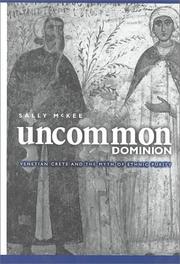| Listing 1 - 9 of 9 |
Sort by
|

ISBN: 2503508189 9782503508184 9782503570624 Year: 1999 Volume: 3 Publisher: Turnhout: Brepols,
Abstract | Keywords | Export | Availability | Bookmark
 Loading...
Loading...Choose an application
- Reference Manager
- EndNote
- RefWorks (Direct export to RefWorks)
The essays presented here cover a range of topics and periods and testify to the breadth and depth of “boundaries” as a concept. The concept’s origins are located in the work of ethnographers, whose most cogent representative is Fredrik Barth. In his seminal work Ethnic Groups and Boundaries, a collection of articles by Barth and others published in 1967, he shifted the scholarly discussion about ethnicity away from particular attributes that define ethnic groups to the boundaries that separate them from another. Boundaries were less significant for what they enclosed than for their very nature and purpose. The disciplines that make most use of the concept of “crossing boundaries” are the youngest, such as feminist and gender studies or, more generally, cultural studies.The first section of the collection consists of literary approaches to boundaries, ranging widely in subject matter from Norman drama to sixteenth-century goodnight ballads. In the second part, the concept of boundaries is brought to bear on the existentia1 plight of Byzantine refugees, Marian devotion in Milanese music, witch hunters’ manuals and finally strangers in Tudors England. In every case, literary texts come into play, but most of these authors seek to apply the concept of transgression and boundaries to their texts in different ways. Individually and as a group, the essays contribute fresh insights into wel1-known and some less familiar works of the Middle Ages and the Renaissance.
History of civilization --- anno 500-1499 --- anno 1500-1799 --- Beschavingsgeschiedenis --- Geschiedenis van de Middeleeuwen --- Geschiedenis van de nieuwe tijden --- Histoire des civilisations --- Histoire des temps modernes --- Histoire du Moyen Age --- Littérature médiévale --- Middeleeuwse letterkunde --- Ethnicity --- Identity (Psychology) --- Ethnic barriers --- Ethnicity in literature --- Identity (Psychology) in literature --- Civilization, Medieval --- Renaissance --- Revival of letters --- Civilization --- History, Modern --- Civilization, Modern --- Humanism --- Middle Ages --- Medieval civilization --- Chivalry --- Boundaries --- Ethnology --- Personal identity --- Personality --- Self --- Ego (Psychology) --- Individuality --- Ethnic identity --- Group identity --- Cultural fusion --- Multiculturalism --- Cultural pluralism --- History --- Civilization, Medieval. --- Ethnic barriers. --- Ethnicity in literature. --- Ethnicity. --- Identity (Psychology) in literature. --- Renaissance. --- Identity (Psychology). --- Cultuurgeschiedenis

ISBN: 0884022455 9780884022459 Year: 1998 Publisher: Washington (D.C.): Dumbarton Oaks research library and collection,
Abstract | Keywords | Export | Availability | Bookmark
 Loading...
Loading...Choose an application
- Reference Manager
- EndNote
- RefWorks (Direct export to RefWorks)
Wills --- Crete (Greece) --- Genealogy --- History --- Sources --- 091 <495 KRETA> --- Handschriftenkunde. Handschriftencatalogi--Griekenland--KRETA --- 091 <495 KRETA> Handschriftenkunde. Handschriftencatalogi--Griekenland--KRETA --- Codicils --- Inheritance and succession --- Legal instruments --- Registers of births, etc. --- Legacies --- Probate records --- Remainders (Estates) --- Law and legislation --- Candia (Greece) --- Creta (Greece) --- Girit (Greece) --- Girit Adasi (Greece) --- Kirid (Greece) --- Krit (Greece) --- Kreta (Greece) --- Krētē (Greece) --- Kríti (Greece) --- Nísos Kríti (Greece) --- I Keretim (Greece) --- I Kritim (Greece) --- Periphereia Krētēs (Greece) --- Periféreia Krítis (Greece) --- Region of Crete (Greece) --- Crete --- Genealogy. --- Sources. --- Wills - Crete --- Crete (Greece) - Genealogy --- Crete (Greece) - History - Venetian rule, 1204-1669 - Sources
Book
ISBN: 0300224699 9780300224696 9780300221367 0300221363 Year: 2017 Publisher: Yale University Press
Abstract | Keywords | Export | Availability | Bookmark
 Loading...
Loading...Choose an application
- Reference Manager
- EndNote
- RefWorks (Direct export to RefWorks)
The extraordinary story of African American composer Edmond Dédé, raised in antebellum New Orleans, and his remarkable career in France In 1855, Edmond Dédé, a free black composer from New Orleans, emigrated to Paris. There he trained with France's best classical musicians and went on to spend thirty-six years in Bordeaux leading the city's most popular orchestras. How did this African American, raised in the biggest slave market in the United States, come to compose ballets for one of the best theaters outside of Paris and gain recognition as one of Bordeaux's most popular orchestra leaders? Beginning with his birth in antebellum New Orleans in 1827 and ending with his death in Paris in 1901, Sally McKee vividly recounts the life of this extraordinary man. From the Crescent City to the City of Light and on to the raucous music halls of Bordeaux, this intimate narrative history brings to life the lost world of exiles and travelers in a rapidly modernizing world that threatened to leave the most vulnerable behind.
Composers --- Dédé, Edmond, --- France. --- Louisiana --- Bro-C'hall --- Fa-kuo --- Fa-lan-hsi --- Faguo --- Falanxi --- Falanxi Gongheguo --- Farans --- Farānsah --- França --- Francia (Republic) --- Francija --- Francja --- Francland --- Francuska --- Franis --- Franḳraykh --- Frankreich --- Frankrig --- Frankrijk --- Frankrike --- Frankryk --- Fransa --- Fransa Respublikası --- Franse --- Franse Republiek --- Frant͡ --- Frant͡s Uls --- Frant͡sii͡ --- Frantsuzskai͡a Rėspublika --- Frantsyi͡ --- Franza --- French Republic --- Frencisc Cynewīse --- Frenska republika --- Furansu --- Furansu Kyōwakoku --- Gallia --- Gallia (Republic) --- Gallikē Dēmokratia --- Hyãsia --- Parancis --- Peurancih --- Phransiya --- Pransiya --- Pransya --- Prantsusmaa --- Pʻŭrangs --- Ranska --- República Francesa --- Republica Franzesa --- Republika Francuska --- Republiḳah ha-Tsarfatit --- Republikang Pranses --- République française --- Tsarfat --- Tsorfat

ISBN: 0812235622 081220381X 1283212110 9786613212115 Year: 2000 Publisher: Philadelphia (Pa.) : University of Pennsylvania press,
Abstract | Keywords | Export | Availability | Bookmark
 Loading...
Loading...Choose an application
- Reference Manager
- EndNote
- RefWorks (Direct export to RefWorks)
Ethnicity --- History. --- History of Southern Europe --- anno 1200-1499 --- anno 1500-1599 --- anno 1600-1699 --- Venice --- Crete
Book
ISBN: 2503570623 Year: 1999 Publisher: Turnhout, Belgium : Brepols,
Abstract | Keywords | Export | Availability | Bookmark
 Loading...
Loading...Choose an application
- Reference Manager
- EndNote
- RefWorks (Direct export to RefWorks)
Ethnicity. --- Identity (Psychology) --- Ethnic barriers. --- Ethnicity in literature. --- Identity (Psychology) in literature. --- Civilization, Medieval. --- Renaissance.
Book
ISBN: 9780812203813 Year: 2010 Publisher: Philadelphia
Abstract | Keywords | Export | Availability | Bookmark
 Loading...
Loading...Choose an application
- Reference Manager
- EndNote
- RefWorks (Direct export to RefWorks)

ISBN: 9780812203813 9780812235623 Year: 2010 Publisher: Philadelphia, Pa University of Pennsylvania Press
Abstract | Keywords | Export | Availability | Bookmark
 Loading...
Loading...Choose an application
- Reference Manager
- EndNote
- RefWorks (Direct export to RefWorks)
Book

ISBN: 9780823296064 Year: 2021 Publisher: New York, NY
Abstract | Keywords | Export | Availability | Bookmark
 Loading...
Loading...Choose an application
- Reference Manager
- EndNote
- RefWorks (Direct export to RefWorks)
Multi

ISBN: 9780823296064 9780823222131 Year: 2021 Publisher: New York, N.Y. Fordham University Press
Abstract | Keywords | Export | Availability | Bookmark
 Loading...
Loading...Choose an application
- Reference Manager
- EndNote
- RefWorks (Direct export to RefWorks)
| Listing 1 - 9 of 9 |
Sort by
|

 Search
Search Feedback
Feedback About UniCat
About UniCat  Help
Help News
News